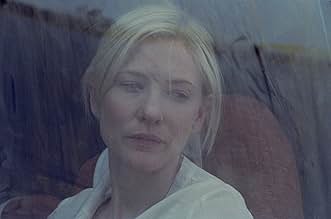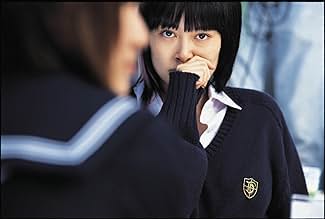Una coppia sposata, in vacanza nel deserto del Marocco, viene colpita da una tragedia che porta alla nascita di una storia che intreccia quattro famiglie diverse.Una coppia sposata, in vacanza nel deserto del Marocco, viene colpita da una tragedia che porta alla nascita di una storia che intreccia quattro famiglie diverse.Una coppia sposata, in vacanza nel deserto del Marocco, viene colpita da una tragedia che porta alla nascita di una storia che intreccia quattro famiglie diverse.
- Regia
- Sceneggiatura
- Star
- Vincitore di 1 Oscar
- 45 vittorie e 137 candidature totali
Recensioni in evidenza
I loved "Amores Perros" It was revolutionary in so many ways and smelled like the real thing even if I couldn't quite put my finger as to what the real thing really was. "21 Grams" had gigantic intentions and superb performances but didn't feel quite revolutionary because we had kind of seen it before - and better - in "Amores Perros". Now "Babel" and, my goodness, the first thing that comes to mind is, what an extraordinary filmmaker Inarritu really is. I suspect that his universe, even if it feels infinite, it is framed - beautifully so - between the walls of biblical references. His methods may be way ahead of the times but the roots are as ancestral as fire itself. I'm not sure where I want to go with all this but the question is, Inarritu is taking me places and that's what I long for in a filmmaker. He's not taking any of us for granted and I'm very grateful for that. His movies are experiences and I for one can't wait for the next one.
I'm generally not a fan of non-linear storytelling in films - there is usually no reason for it and it can be frustrating and difficult to follow the plot. While the plot in 'Babel' is relatively easy to follow, the film still suffers the same annoying problems as other non-linear films.
The most irritating thing for me is how scenes that are connected and happening at the same time are presented so far apart. At the very start of the film we see kids fire a bullet at a coach, yet the scene that logically goes together with this from inside the coach does come until a significant while later.
The viewer also never gets to properly know any of the characters - there's no time for any character development as the film is constantly going back and forth between characters and situations. As a result, you don't really care for what happens to any of them.
The saving grace of 'Babel' is its ending, which brings everything together and wraps the story up nicely. Even though it can be a frustrating watch at times, 'Babel' is a smart and well-made film.
The most irritating thing for me is how scenes that are connected and happening at the same time are presented so far apart. At the very start of the film we see kids fire a bullet at a coach, yet the scene that logically goes together with this from inside the coach does come until a significant while later.
The viewer also never gets to properly know any of the characters - there's no time for any character development as the film is constantly going back and forth between characters and situations. As a result, you don't really care for what happens to any of them.
The saving grace of 'Babel' is its ending, which brings everything together and wraps the story up nicely. Even though it can be a frustrating watch at times, 'Babel' is a smart and well-made film.
Alejandro Gonzalez Inarritu's Babel weaves four disparate and seemingly unrelated tales into a distinct, gritty narrative about the importance of communication - and what can happen when it goes awry. The movie is oftentimes difficult to watch, with ultrarealistic cinematography and gutsy, honest performances from its entire cast, particularly Oscar-nominated actresses Adriana Barraza (Amelia) and Rinko Kikuchi (Chieko).
Told nonlinearly, the movie describes the travails of a troubled married couple with a tour group in Morocco, played by Brad Pitt and Cate Blanchett. Something in their past has driven them apart, and to help deal with the problem they have taken a trip together. Meanwhile, the sons of a shepherd fight over who's the better shot with their new rifle and fire a blast at the couple's tour bus, critically wounding Susan (Blanchett).
Richard (Pitt) calls home in San Diego to notify the nanny of their children, Amelia; Amelia is in a bit of a bind, because she expected the parents home so she could attend the wedding of her son in Mexico. With Richard and Susan not returning soon, and with no one else available to watch the children, she takes them with her to the wedding.
In Japan, a deaf-mute Japanese girl acts out in reaction to her mother's suicide, which she discovered; the virginal Chieko becomes a huge sexual flirt, even removing her panties in a crowded restaurant to flash older boys. Chieko craves human contact but feels that the world's even more shut off to her now than ever before, and she sullenly shuns even her father's attentions.
It should go without saying that this film really isn't for everyone. It's gut-wrenchingly tough to watch at times, especially when Susan's wound is being treated. You can readily imagine how it'd be if you, an unworldly American, were suddenly in dire need of expert medical attention in a part of the world that wasn't really famed for it. That's enough to strike terror in me already, and I haven't even mentioned how Richard and Susan are awaiting help to arrive in a small, impoverished village with no running water or electricity - and only one person who can speak English to them.
How exactly these stories are commingled becomes evident as the movie progresses, but it's not all elegantly laid out for the viewer to immediately grasp; this is accomplished in part by the nonlinear storytelling. We see a scene near the end of the movie that is a mirror image of one from the beginning, except told from a different character's perspective. That's a tribute to the wonderful camera-work and editing by, respectively, Rodrigo Prieto and the team of Douglas Crise and Stephen Mirrone.
Barraza turns in a powerful, heart-breaking performance; at one point, she's stranded in the middle of the Sonoran desert with her two young charges clad in her dress from the wedding. Dazed by the blistering heat, Amelia cannot gain her bearings in the blazing heat, and she despairs. Then she makes a critical decision with devastating consequences.
Kikuchi is absolutely mesmerizing as the silent Chieko. Without uttering one word, she's able to convey a vast array of emotions, from loneliness to hostility to love to lust to affection. She's alternately serene and violent, in charge of and captured by her impediment. Chieko resents her father, her volleyball teammates, and most of all every so-called normal person who looks at deaf-mutes as monsters, creatures to be scorned and taken advantage of. Like Barraza, Kikuchi's role called for a difficult sacrifice: plenty of nudity.
Babel is a spellbinding, multifaceted story with towering, passionate performances by all of the leads. It's full of moxie and stark realism, and despite some minor plot implausibilities, it's a true feather in the cap for Inarritu.
Told nonlinearly, the movie describes the travails of a troubled married couple with a tour group in Morocco, played by Brad Pitt and Cate Blanchett. Something in their past has driven them apart, and to help deal with the problem they have taken a trip together. Meanwhile, the sons of a shepherd fight over who's the better shot with their new rifle and fire a blast at the couple's tour bus, critically wounding Susan (Blanchett).
Richard (Pitt) calls home in San Diego to notify the nanny of their children, Amelia; Amelia is in a bit of a bind, because she expected the parents home so she could attend the wedding of her son in Mexico. With Richard and Susan not returning soon, and with no one else available to watch the children, she takes them with her to the wedding.
In Japan, a deaf-mute Japanese girl acts out in reaction to her mother's suicide, which she discovered; the virginal Chieko becomes a huge sexual flirt, even removing her panties in a crowded restaurant to flash older boys. Chieko craves human contact but feels that the world's even more shut off to her now than ever before, and she sullenly shuns even her father's attentions.
It should go without saying that this film really isn't for everyone. It's gut-wrenchingly tough to watch at times, especially when Susan's wound is being treated. You can readily imagine how it'd be if you, an unworldly American, were suddenly in dire need of expert medical attention in a part of the world that wasn't really famed for it. That's enough to strike terror in me already, and I haven't even mentioned how Richard and Susan are awaiting help to arrive in a small, impoverished village with no running water or electricity - and only one person who can speak English to them.
How exactly these stories are commingled becomes evident as the movie progresses, but it's not all elegantly laid out for the viewer to immediately grasp; this is accomplished in part by the nonlinear storytelling. We see a scene near the end of the movie that is a mirror image of one from the beginning, except told from a different character's perspective. That's a tribute to the wonderful camera-work and editing by, respectively, Rodrigo Prieto and the team of Douglas Crise and Stephen Mirrone.
Barraza turns in a powerful, heart-breaking performance; at one point, she's stranded in the middle of the Sonoran desert with her two young charges clad in her dress from the wedding. Dazed by the blistering heat, Amelia cannot gain her bearings in the blazing heat, and she despairs. Then she makes a critical decision with devastating consequences.
Kikuchi is absolutely mesmerizing as the silent Chieko. Without uttering one word, she's able to convey a vast array of emotions, from loneliness to hostility to love to lust to affection. She's alternately serene and violent, in charge of and captured by her impediment. Chieko resents her father, her volleyball teammates, and most of all every so-called normal person who looks at deaf-mutes as monsters, creatures to be scorned and taken advantage of. Like Barraza, Kikuchi's role called for a difficult sacrifice: plenty of nudity.
Babel is a spellbinding, multifaceted story with towering, passionate performances by all of the leads. It's full of moxie and stark realism, and despite some minor plot implausibilities, it's a true feather in the cap for Inarritu.
Alejandro González Iñárritu's direction is brilliantly layered and intricately woven. He deftly uses different film stock, imagery, sound, and stories to weave a single tale out of four disparate ones, a talent he's shown in other films.
The story by screenwriter Guillermo Arriaga and Iñárritu has one incident ricochet around the globe, and peeling back the layers of culture to show the frustrating inability to communicate, and the poignancy and universality of familial love.
Each story is complete, but a series of snapshots that leave as many questions as answers. As the stories unfold, the backstories and the futures of the characters are chock full of possibility and pain. As one commenter during the Q&A said, it was frustratingly beautiful. Each storyline deals with family and conflict from the inability to communicate or to understand.
All the performances are incredible, and very touching. Brad Pitt did an excellent job, and the always outstanding Cate Blanchett, a powerhouse actor if there ever was one, has the least screen time of any of the leads. Few can do so much with so little. But the really outstanding performance is Rinko Kikuchi as a deaf-mute Tokyo teen.
To say any more would possibly lesson the experience, so let me just say this: it may seem confusing at times, but by the end, it will seem like poetry.
The story by screenwriter Guillermo Arriaga and Iñárritu has one incident ricochet around the globe, and peeling back the layers of culture to show the frustrating inability to communicate, and the poignancy and universality of familial love.
Each story is complete, but a series of snapshots that leave as many questions as answers. As the stories unfold, the backstories and the futures of the characters are chock full of possibility and pain. As one commenter during the Q&A said, it was frustratingly beautiful. Each storyline deals with family and conflict from the inability to communicate or to understand.
All the performances are incredible, and very touching. Brad Pitt did an excellent job, and the always outstanding Cate Blanchett, a powerhouse actor if there ever was one, has the least screen time of any of the leads. Few can do so much with so little. But the really outstanding performance is Rinko Kikuchi as a deaf-mute Tokyo teen.
To say any more would possibly lesson the experience, so let me just say this: it may seem confusing at times, but by the end, it will seem like poetry.
"Babel" centers on several groups of people in 4 countries that are all connected by one freak accident
Alejandro González Iñárritu takes us from North Africa to North America to Asia
His film exposes four unconnected story lines that are eventually divulged to be inextricably linked to one another
The first involves an isolated family of goat herders who live in the High Plateaus of the Moroccan desert where two young boys are testing a rifle's range handed by their father to protect their goats from jackals...
The second concerns a Middle-class American couple on a bus tour of Morocco trying to save together their damaged marriage
Meanwhile, in the US, there is grave danger for an undocumented immigranta Mexican nanny as she tries to return to United States after she wrongfully decides to take her two blonde-haired young charges to her son's wedding across the Mexican border, despite her employers' sudden change of plans, that needs that she remains with them and miss the joyful occasion
And on the opposite side of the world, we follow, in Tokyo, an alienated, confused deaf and mute teenage student, recovering from her mother's suicide, who eases her feelings of depression and loneliness by trying to win the friendship or attention of every man or adolescent who crosses her path She flirts with sexual exhibitionism to attract the attention of her distant and uncommunicative father
"Babel" tries to make a point and the point is that when people can't or won't communicate, unpredictable paths can lead to tragic consequences It also tries to leave a message of how a 'shooting' from a simple 'gift' can set off a chain reaction of tragic events in three continents and four countries over which the different characters have exceedingly uncomfortable human emotion
Out of the entire cast, it is only Rinko Kikuchi as Chieko who steals the movie especially when she transmits to her friends her mad decision of sexual aggressiveness, saying to all: "Now they're going to meet the real hairy monster." This scene remembered me, in some way, Sharon Stone uncrossing legs in "Basic Instinct."
The first involves an isolated family of goat herders who live in the High Plateaus of the Moroccan desert where two young boys are testing a rifle's range handed by their father to protect their goats from jackals...
The second concerns a Middle-class American couple on a bus tour of Morocco trying to save together their damaged marriage
Meanwhile, in the US, there is grave danger for an undocumented immigranta Mexican nanny as she tries to return to United States after she wrongfully decides to take her two blonde-haired young charges to her son's wedding across the Mexican border, despite her employers' sudden change of plans, that needs that she remains with them and miss the joyful occasion
And on the opposite side of the world, we follow, in Tokyo, an alienated, confused deaf and mute teenage student, recovering from her mother's suicide, who eases her feelings of depression and loneliness by trying to win the friendship or attention of every man or adolescent who crosses her path She flirts with sexual exhibitionism to attract the attention of her distant and uncommunicative father
"Babel" tries to make a point and the point is that when people can't or won't communicate, unpredictable paths can lead to tragic consequences It also tries to leave a message of how a 'shooting' from a simple 'gift' can set off a chain reaction of tragic events in three continents and four countries over which the different characters have exceedingly uncomfortable human emotion
Out of the entire cast, it is only Rinko Kikuchi as Chieko who steals the movie especially when she transmits to her friends her mad decision of sexual aggressiveness, saying to all: "Now they're going to meet the real hairy monster." This scene remembered me, in some way, Sharon Stone uncrossing legs in "Basic Instinct."
Lo sapevi?
- QuizThe scene where Chieko (Rinko Kikuchi) and her father are in the car together was shot without filming permission from the city due to slow Japanese bureaucratic procedures. The crew created "man-made" busy traffic, and began shooting the scene. Later the police started chasing them while still shooting the scene.
- BlooperAfter the wedding, Amelia, her nephew and the Jones children use the Tecate border crossing to reenter the USA. After fleeing, we are shown a sandy, wide desert where they wander. Actually, the Tecate border crossing is in the mountains, there is no such desert within a reasonable distance on the USA side. What is shown looks like an Arizona border crossing.
- Citazioni
Mike Jones: My mom said Mexico is dangerous.
Santiago: [in Spanish] Yes, it's full of Mexicans.
- Colonne sonorePara Que Regreses
El Chapo
Gabriel Ramirez
Maximo Aguirre Music Publishing, Inc.
D Disa Latin Music, S. de R.L. de C.V
I più visti
Accedi per valutare e creare un elenco di titoli salvati per ottenere consigli personalizzati
Dettagli
- Data di uscita
- Paesi di origine
- Lingue
- Celebre anche come
- Tháp Babel
- Luoghi delle riprese
- Aziende produttrici
- Vedi altri crediti dell’azienda su IMDbPro
Botteghino
- Budget
- 25.000.000 USD (previsto)
- Lordo Stati Uniti e Canada
- 34.302.837 USD
- Fine settimana di apertura Stati Uniti e Canada
- 389.351 USD
- 29 ott 2006
- Lordo in tutto il mondo
- 135.330.835 USD
- Tempo di esecuzione2 ore 23 minuti
- Colore
- Mix di suoni
- Proporzioni
- 1.85 : 1
Contribuisci a questa pagina
Suggerisci una modifica o aggiungi i contenuti mancanti


































